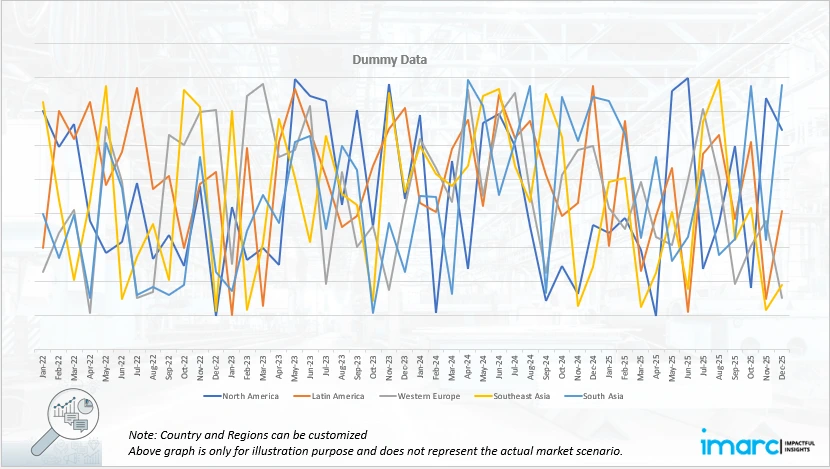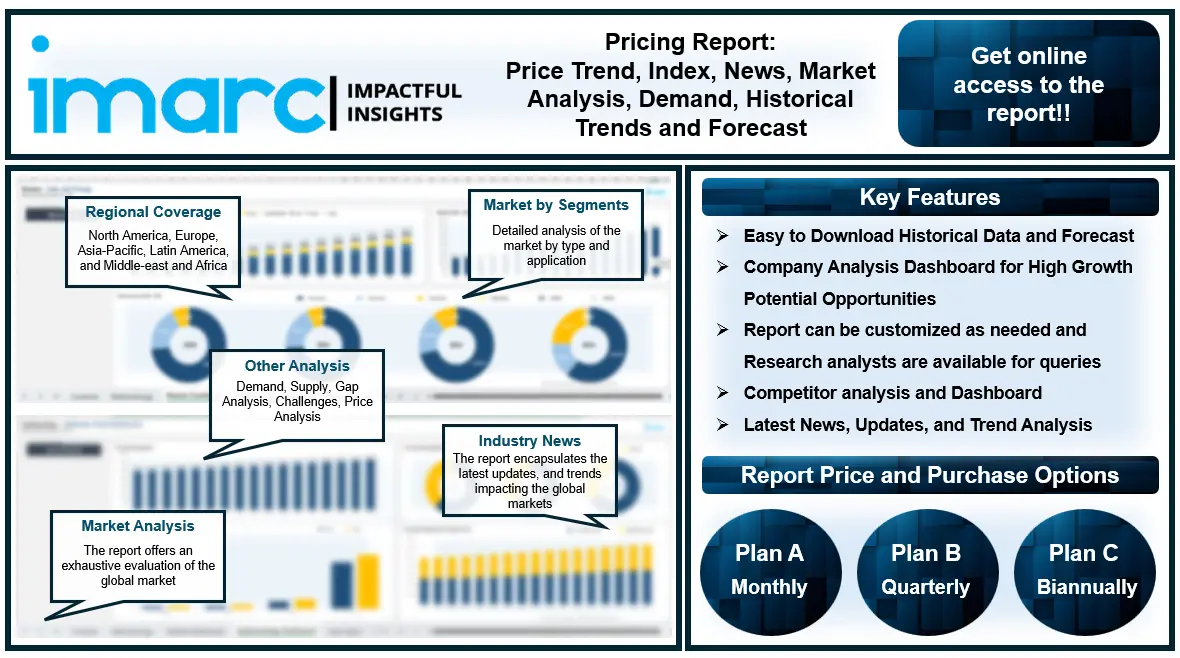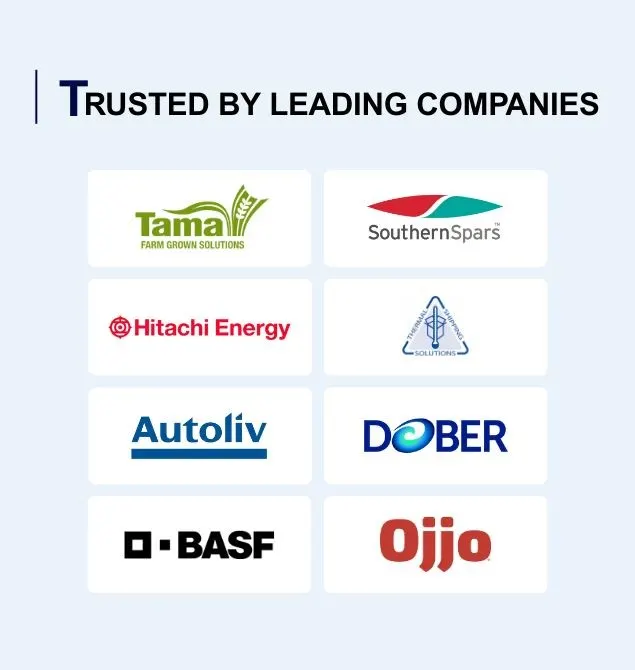
Nitrosylsulfuric Acid Prices, Trend, Chart, Market Analysis, News, Demand, Historical and Forecast Data Report 2025 Edition
Nitrosylsulfuric Acid Price Trend, Index and Forecast
Track the latest insights on nitrosylsulfuric acid price trend and forecast with detailed analysis of regional fluctuations and market dynamics across North America, Latin America, Central Europe, Western Europe, Eastern Europe, Middle East, North Africa, West Africa, Central and Southern Africa, Central Asia, Southeast Asia, South Asia, East Asia, and Oceania.
Nitrosylsulfuric Acid Prices Outlook Q3 2025
- USA: USD 268/MT
- China: USD 224/MT
- Germany: USD 251/MT
- Belgium: USD 274/MT
- Japan: USD 238/MT
Nitrosylsulfuric Acid Price Chart

Get real-time access to monthly/quarterly/yearly prices Request Sample
During the third quarter of 2025, the nitrosylsulfuric acid prices in the USA reached 268 USD/MT in September. Prices moved downward as stable domestic production and adequate inventories coincided with measured demand from the chemical intermediates and explosives sectors. Buyers adopted cautious procurement strategies, while competitive availability from regional producers limited suppliers’ ability to maintain higher transaction levels.
During the third quarter of 2025, the nitrosylsulfuric acid prices in China reached 224 USD/MT in September. Prices moved upward due to stronger demand from downstream nitration applications and improved operating rates at chemical manufacturing units. Supply tightness emerged as some producers exercised output discipline, while sustained consumption from industrial users supported firmer pricing sentiment across the domestic market.
During the third quarter of 2025, the nitrosylsulfuric acid prices in Germany reached 251 USD/MT in September. Prices edged lower as moderated demand from the specialty chemicals sector coincided with comfortable supply availability. Improved logistics efficiency and stable input cost conditions reduced cost side pressure, encouraging suppliers to revise offers downward to sustain contract volumes.
During the third quarter of 2025, the nitrosylsulfuric acid prices in Belgium reached 274 USD/MT in September. Prices declined as subdued downstream demand and sufficient regional supply weighed on market sentiment. Competitive intra-European trade flows and cautious purchasing behavior among buyers further contributed to softer negotiated price levels across the quarter.
During the third quarter of 2025, the nitrosylsulfuric acid prices in Japan reached 238 USD/MT in September. Prices increased as demand strengthened from the chemicals and pharmaceuticals sectors. Controlled production levels and reliance on stable domestic supply chains limited material availability, allowing producers to implement firmer pricing despite generally balanced consumption patterns.
Nitrosylsulfuric Acid Prices Outlook Q2 2025
- USA: USD 275/MT
- China: USD 210/MT
- Germany: USD 255/MT
- Belgium: USD 280/MT
- Japan: USD 220/MT
During the second quarter of 2025, nitrosylsulfuric acid prices in the USA reached 275 USD/MT in June. Nitrosylsulfuric acid prices in the USA trended slightly upward, supported by steady demand from pharmaceutical intermediates and specialty chemical manufacturing. Occasional logistical delays and elevated freight charges tightened spot availability, prompting incremental price adjustments. Domestic production operated steadily, with cost structures largely stable, but inventory management remained cautious to prevent overstocking. By quarter’s end, market sentiment leaned firm, reflecting healthy downstream activity and a preference for secure, contract-based sourcing over speculative buying, ensuring consistent demand-driven support for prices.
During the second quarter of 2025, nitrosylsulfuric acid prices in China reached 210 USD/MT in June. China’s nitrosylsulfuric acid market-maintained firm to slightly higher pricing, driven by sustained demand from textile dyeing, pigments, and pharmaceutical intermediates. Strong domestic manufacturing capacity, coupled with vertically integrated supply chains, ensured consistent availability, though export logistics occasionally faced delays. Market participants focused on fulfilling long-term contracts, limiting volatility. Competitive production costs helped keep price increases measured. At the same time, healthy consumption from the dye industry acted as the main driver of price stability, allowing the market to end the quarter on a steady footing.
During the second quarter of 2025, the nitrosylsulfuric acid prices in Germany reached 255 USD/MT in June. Germany’s nitrosylsulfuric acid prices held generally steady with a mild upward bias. Demand from pharmaceutical synthesis, pigments, and dyes remained firm, while domestic producers balanced output to match downstream requirements. Energy costs and raw material pricing stayed relatively contained, preventing sharp fluctuations. Buyers adopted a measured procurement approach, avoiding excessive inventory buildup. Stable supply conditions, coupled with resilient industrial activity, kept the market steady, and by quarter’s close, prices reflected a balanced, demand-aligned environment without disruptive surges or abrupt declines.
During the second quarter of 2025, the nitrosylsulfuric acid prices in Belgium reached 280 USD/MT in June. Belgium’s nitrosylsulfuric acid prices followed broader European market patterns, showing stability with slight firmness in response to steady downstream demand. Key applications in dye manufacturing, pigments, and specialty chemicals supported consistent consumption. Producers managed supply effectively, preventing imbalances and avoiding sharp swings. Energy and input costs remained manageable, helping to limit volatility. The quarter ended with a cautiously optimistic tone, as restocking activity in preparation for later demand cycles provided modest upward support to an otherwise balanced price environment.
During the second quarter of 2025, the nitrosylsulfuric acid prices in Japan reached 220 USD/MT in June. Japan’s nitrosylsulfuric acid market saw stable to slightly firmer prices, supported by steady demand from dye manufacturing, pharmaceutical production, and specialty chemical applications. Domestic supply was well managed, ensuring consistent availability while limiting spot market fluctuations. Export activity also contributed to market stability, with Asian regional trade flows supporting balanced pricing. Procurement patterns remained steady, with buyers focusing on contractual volumes over speculative purchases. By the quarter’s end, the market retained a firm but stable pricing tone, underpinned by consistent industrial consumption.
Regional Coverage
The report provides a detailed analysis of the market across different regions, each with unique pricing dynamics influenced by localized market conditions, supply chain intricacies, and geopolitical factors. This includes price trends, price forecast and supply and demand trends for each region, along with spot prices by major ports. The report also provides coverage of FOB and CIF prices, as well as the key factors influencing the nitrosylsulfuric acid prices.
Europe Nitrosylsulfuric Acid Price Trend
Q3 2025:
As per the nitrosylsulfuric acid price index, prices in Europe followed a downward trend, reflecting consistent declines across key markets such as Germany and Belgium. Comfortable inventory levels and softened demand from specialty and industrial chemical applications reduced procurement urgency among buyers. Improved logistics efficiency and stable feedstock cost conditions further eased production pressure. In addition, competitive intra-regional supply dynamics and cautious purchasing behavior reinforced the sustained downward pricing environment across Europe.
Q2 2025:
Nitrosylsulfuric acid prices across Europe remained relatively stable with a slight firming trend. Steady demand from the pharmaceutical, textile, and coatings sectors supported pricing, while moderate energy and raw material costs helped contain volatility. Logistical constraints, including freight rate pressures, lent mild upward pressure on spot prices, even as supply chains held up. Inventory levels were balanced as producers synchronized output to consumption. Overall, the market was characterized by prudent restocking amid consistent industrial activity.
This analysis can be extended to include detailed nitrosylsulfuric acid price information for a comprehensive list of countries.
| Region | Countries Covered |
|---|---|
| Europe | Germany, France, United Kingdom, Italy, Spain, Russia, Turkey, Netherlands, Poland, Sweden, Belgium, Austria, Ireland, Switzerland, Norway, Denmark, Romania, Finland, Czech Republic, Portugal, and Greece, among other European countries. |
North America Nitrosylsulfuric Acid Price Trend
Q3 2025:
As per the nitrosylsulfuric acid price index, North America experienced a mild downward trend, closely aligned with declining prices in the USA. Adequate domestic production and stable inventory positions ensured uninterrupted supply availability, limiting any potential price support. Demand from chemical processing, explosives, and industrial applications remained measured, prompting buyers to negotiate conservatively. The absence of major operational disruptions and balanced supply demand fundamentals prevented any meaningful upward price movement across the regional market.
Q2 2025:
In North America, prices remained largely stable, with underpinned by solid demand in pharmaceuticals, dyes, and agrochemicals. Import disruptions and elevated logistics costs occasionally tightened supply, nudging spot prices upward. Major users leaned toward contract-based procurement, minimizing inventory risks. Supply from domestic producers remained stable, cushioning market movement. As a result, the quarter exhibited cautious optimism, supported by consistent downstream demand and a focus on securing supply rather than opportunistic buying.
Specific nitrosylsulfuric acid historical data within the United States and Canada can also be provided.
| Region | Countries Covered |
|---|---|
| North America | United States and Canada |
Middle East and Africa Nitrosylsulfuric acid Price Trend
Q3 2025:
As per nitrosylsulfuric acid price chart, the prices in the Middle East and Africa fluctuated due to a complex interplay of factors, primarily driven by supply chain disruptions, seasonal demand shifts, and geopolitical influences.
Q2 2025:
The report explores the nitrosylsulfuric acid pricing trends and nitrosylsulfuric acid price chart in the Middle East and Africa, considering factors like regional industrial growth, the availability of natural resources, and geopolitical tensions that uniquely influence market prices.
In addition to region-wise data, information on nitrosylsulfuric acid prices for countries can also be provided.
| Region | Countries Covered |
|---|---|
| Middle East & Africa | Saudi Arabia, UAE, Israel, Iran, South Africa, Nigeria, Oman, Kuwait, Qatar, Iraq, Egypt, Algeria, and Morocco, among other Middle Eastern and African countries. |
Asia Pacific Nitrosylsulfuric acid Price Trend
Q3 2025:
In the Asia Pacific region, nitrosylsulfuric acid prices displayed an upward trend, influenced by firmer prices in China and Japan amid improving downstream demand. Stronger offtake from nitration based chemical applications and controlled production rates tightened availability in certain markets. These upward pressures were partially offset by stable conditions in other Asian countries, resulting in a balanced regional outlook. Differences in industrial activity levels and supply discipline shaped localized pricing behavior across the region.
Q2 2025:
The Asia Pacific nitrosylsulfuric acid market maintained steady-to-firm pricing, with sustained demand from textiles, pharmaceuticals, and specialty chemicals driving volumes. Expanding dye and synthetic textile production hubs in the region elevated consumption, while production costs remained relatively stable. Supply chains remained balanced, though heightened freight charges and regional supply nuances introduced mild tension. Overall, procurement trends emphasized contract fulfillment over speculative buying, contributing to a measured yet upward-leaning pricing environment.
This nitrosylsulfuric acid price analysis can be expanded to include a comprehensive list of countries within the region.
| Region | Countries Covered |
|---|---|
| Asia Pacific | China, India, Indonesia, Pakistan, Bangladesh, Japan, Philippines, Vietnam, Thailand, South Korea, Malaysia, Nepal, Taiwan, Sri Lanka, Hongkong, Singapore, Australia, and New Zealand, among other Asian countries. |
Latin America Nitrosylsulfuric acid Price Trend
Q3 2025:
Latin America's nitrosylsulfuric acid market is predominantly influenced by its rich natural reserves, particularly in countries like Chile and Brazil. However, political instability and inconsistent regulatory frameworks can lead to significant volatility in nitrosylsulfuric acid prices.
Q2 2025:
Infrastructure challenges and logistical inefficiencies often impact the supply chain, affecting Latin America’s ability to meet international demand consistently. Moreover, the nitrosylsulfuric acid price index, economic fluctuations, and currency devaluation are critical factors that need to be considered when analyzing nitrosylsulfuric acid pricing trends in this region.
This comprehensive review can be extended to include specific countries within the region.
| Region | Countries Covered |
|---|---|
| Latin America | Brazil, Mexico, Argentina, Columbia, Chile, Ecuador, and Peru, among other Latin American countries. |
Nitrosylsulfuric Acid Pricing Report, Market Analysis, and News
IMARC's latest publication, “Nitrosylsulfuric Acid Prices, Trend, Chart, Demand, Market Analysis, News, Historical and Forecast Data Report 2025 Edition,” presents a detailed examination of the nitrosylsulfuric acid market, providing insights into both global and regional trends that are shaping prices. This report delves into the spot price of nitrosylsulfuric acid at major ports and analyzes the composition of prices, including FOB and CIF terms. It also presents detailed nitrosylsulfuric acid prices trend analysis by region, covering North America, Europe, Asia Pacific, Latin America, and Middle East and Africa. The factors affecting nitrosylsulfuric acid pricing, such as the dynamics of supply and demand, geopolitical influences, and sector-specific developments, are thoroughly explored. This comprehensive report helps stakeholders stay informed with the latest market news, regulatory updates, and technological progress, facilitating informed strategic decision-making and forecasting.
Nitrosylsulfuric Acid Industry Analysis
The global nitrosylsulfuric acid industry size reached 392.9 Thousand Tons in 2025. By 2034, IMARC Group expects the market to reach 547.9 Thousand Tons, at a projected CAGR of 3.76% during 2026-2034. The market growth is driven by sustained demand from nitration processes, expanding applications in specialty chemicals and pharmaceuticals, and continued industrialization supporting consumption across chemical manufacturing value chains.
Latest News and Developments:
- November 2025: Deepak Chem Tech Limited, a wholly owned subsidiary of Deepak Nitrite, which is a prominent producer of nitrosylsulfuric acid, raised INR 32 crore through the allotment of some optionally convertible redeemable preference shares to Deepak Phenolics Limited. The shares were issued to strengthen the company’s capital base and fund ongoing projects. Despite the transaction, Deepak Nitrite retains full equity ownership.
Product Description
Nitrosylsulfuric acid (NSA) is a highly corrosive and reactive chemical compound with the formula NOSO3H. It is produced by dissolving nitrogen dioxide (NO2) in concentrated sulfuric acid (H2SO4). The resultant solution comprises nitrosylsulfuric acid, sulfuric acid, and trace amounts of nitrogen oxides. NSA is widely employed as a nitrating agent in a variety of chemical processes, particularly in the synthesis of organic molecules like medicines, dyes, explosives, and agrochemicals. It is prized for its capacity to insert nitroso (NO) functional groups into organic molecules, allowing the synthesis of a diverse spectrum of nitrogen-containing chemicals. Due to its extremely reactive nature and corrosive qualities, NSA should be handled with utmost caution.
Report Coverage
| Key Attributes | Details |
|---|---|
| Product Name | Nitrosylsulfuric Acid |
| Report Features | Exploration of Historical Trends and Market Outlook, Industry Demand, Industry Supply, Gap Analysis, Challenges, Nitrosylsulfuric Acid Price Analysis, and Segment-Wise Assessment. |
| Currency/Units | US$ (Data can also be provided in local currency) or Metric Tons |
| Region/Countries Covered | The current coverage includes analysis at the global and regional levels only. Based on your requirements, we can also customize the report and provide specific information for the following countries: Asia Pacific: China, India, Indonesia, Pakistan, Bangladesh, Japan, Philippines, Vietnam, Thailand, South Korea, Malaysia, Nepal, Taiwan, Sri Lanka, Hongkong, Singapore, Australia, and New Zealand* Europe: Germany, France, United Kingdom, Italy, Spain, Russia, Turkey, Netherlands, Poland, Sweden, Belgium, Austria, Ireland, Switzerland, Norway, Denmark, Romania, Finland, Czech Republic, Portugal and Greece* North America: United States and Canada Latin America: Brazil, Mexico, Argentina, Columbia, Chile, Ecuador, and Peru* Middle East & Africa: Saudi Arabia, UAE, Israel, Iran, South Africa, Nigeria, Oman, Kuwait, Qatar, Iraq, Egypt, Algeria, and Morocco* *The list of countries presented is not exhaustive. Information on additional countries can be provided if required by the client. |
| Information Covered for Key Suppliers |
|
| Customization Scope | The report can be customized as per the requirements of the customer |
| Report Price and Purchase Option |
Plan A: Monthly Updates - Annual Subscription
Plan B: Quarterly Updates - Annual Subscription
Plan C: Biannually Updates - Annual Subscription
|
| Post-Sale Analyst Support | 360-degree analyst support after report delivery |
| Delivery Format | PDF and Excel through email (We can also provide the editable version of the report in PPT/Word format on special request) |
Key Benefits for Stakeholders:
- IMARC’s report presents a detailed analysis of nitrosylsulfuric acid pricing, covering global and regional trends, spot prices at key ports, and a breakdown of Ex Works, FOB, and CIF prices.
- The study examines factors affecting nitrosylsulfuric acid price trend, including raw material costs, supply-demand shifts, geopolitical impacts, and industry developments, offering insights for informed decision-making.
- The competitive landscape review equips stakeholders with crucial insights into the latest market news, regulatory changes, and technological advancements, ensuring a well-rounded, strategic overview for forecasting and planning.
- IMARC offers various subscription options, including monthly, quarterly, and biannual updates, allowing clients to stay informed with the latest market trends, ongoing developments, and comprehensive market insights. The nitrosylsulfuric acid price charts ensure our clients remain at the forefront of the industry.
Need more help?
- Speak to our experienced analysts for insights on the current market scenarios.
- Include additional segments and countries to customize the report as per your requirement.
- Gain an unparalleled competitive advantage in your domain by understanding how to utilize the report and positively impacting your operations and revenue.
- For further assistance, please connect with our analysts.
Why Choose Us
IMARC offers trustworthy, data-centric insights into commodity pricing and evolving market trends, enabling businesses to make well-informed decisions in areas such as procurement, strategic planning, and investments. With in-depth knowledge spanning more than 1000 commodities and a vast global presence in over 150 countries, we provide tailored, actionable intelligence designed to meet the specific needs of diverse industries and markets.
1000
+Commodities
150
+Countries Covered
3000
+Clients
20
+Industry
Robust Methodologies & Extensive Resources
IMARC delivers precise commodity pricing insights using proven methodologies and a wealth of data to support strategic decision-making.
Subscription-Based Databases
Our extensive databases provide detailed commodity pricing, import-export trade statistics, and shipment-level tracking for comprehensive market analysis.
Primary Research-Driven Insights
Through direct supplier surveys and expert interviews, we gather real-time market data to enhance pricing accuracy and trend forecasting.
Extensive Secondary Research
We analyze industry reports, trade publications, and market studies to offer tailored intelligence and actionable commodity market insights.
Trusted by 3000+ industry leaders worldwide to drive data-backed decisions. From global manufacturers to government agencies, our clients rely on us for accurate pricing, deep market intelligence, and forward-looking insights.

 Request Customization
Request Customization
 Inquire Before Buying
Inquire Before Buying
 Speak to an Analyst
Speak to an Analyst Request Brochure
Request Brochure




.webp)




.webp)












